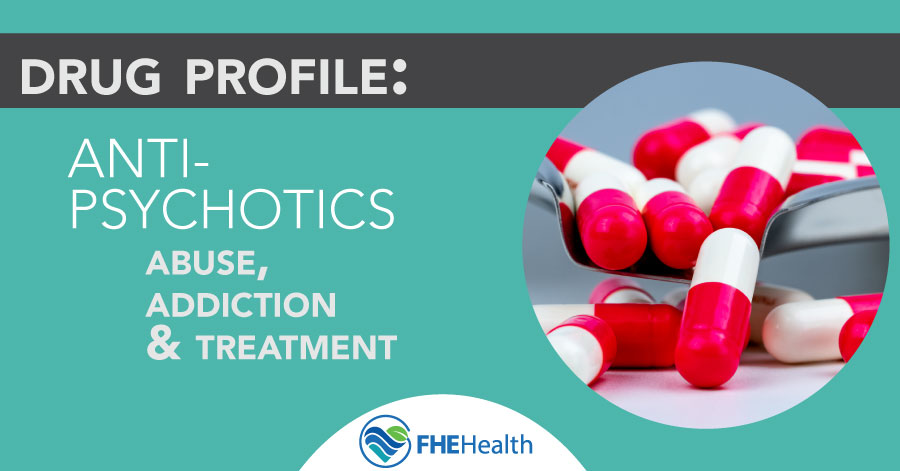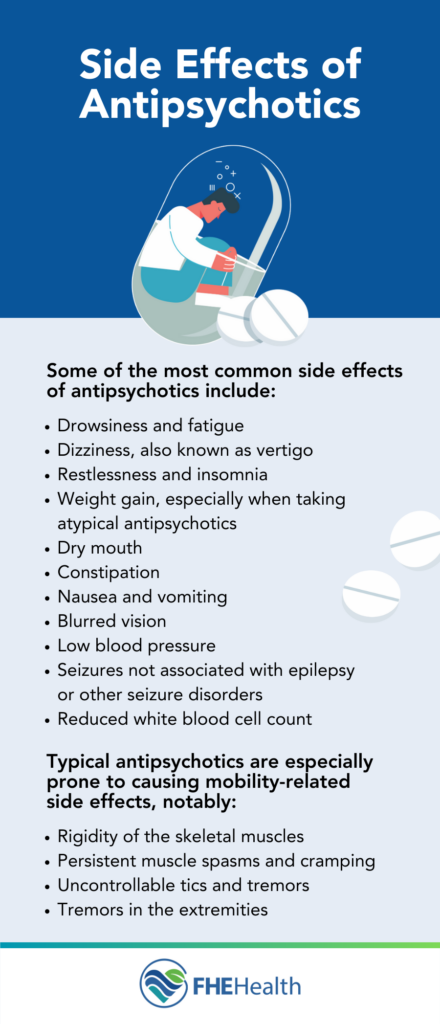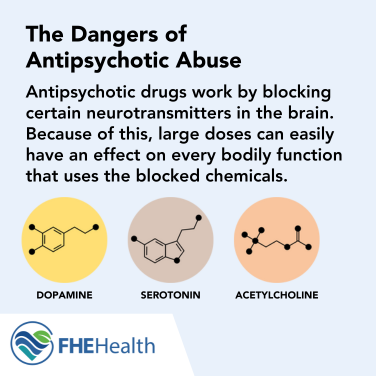
Antipsychotics are a large class of drugs used to treat mental health conditions. They’re most often used for treating schizophrenia and other psychotic disorders, but they have many off-label uses in the United States. Psychosis disorders affect roughly 0.4% of adults worldwide, yet nearly 1.7% of American adults report taking an antipsychotic medication in the last 12 months.
The family of antipsychotic medications is large and always growing. Drugs in this class include:
- Chlorpromazine
- Fluphenazine
- Haloperidol
- Loxapine
- Pimozide
- Perphenazine
- Prochlorperazine maleate
- Intravenous quetiapine
- Thioridazine
- Thiothixene
- Trifluoperazine
While all antipsychotics play a role in the treatment of schizophrenia, many of them are also prescribed to treat other conditions, including:
- Acute mania
- Bipolar disorder
- Treatment-resistant depression
- Agitation
- Generalized (nonpsychotic) anxiety
- Hyperactivity
- Tourette syndrome
Antipsychotic drugs have traditionally been treated as uncontrolled prescription medication in the United States. This is because it used to be thought that these drugs, while potentially dangerous if not prescribed by a doctor, presented a very low risk of misuse. Until recently, the general feeling among medical professionals was that few people, if any, would ever use this class of drug for recreational abuse.
That’s changed. Starting with incarcerated drug users, antipsychotics have become increasingly popular for recreational uses. The first case of recreational abuse of an antipsychotic drug appeared in the medical literature in 2005, describing an incarcerated man’s misuse of intravenous quetiapine. Since then, the trend has spread through correctional facilities and into street culture in the United States.
Identifying Antipsychotics
By far, the most common antipsychotic drug to be abused is quetiapine under the brand name Seroquel. People who use the drug don’t seem to be getting high directly from it. Instead, quetiapine is most commonly used to enhance the effects of other drugs, notably cocaine and heroin.
Seroquel comes in tablet form at a dosage range from 25 to 400 mg. The pills may be white, yellow, tan, light blue or peach-colored. They can be circular or oblong. Most of the time the brand name is printed on the tablet. These tablets are sold the same way other drugs of abuse are, and they fetch a street price from $3 for a 25 mg tablet to $8 for 100 mg. Higher doses don’t seem to have a greater effect in enhancing street drugs, so most of the traffic is limited to 100 mg or below.
Seroquel is traded on the street under several slang terms. These include “quell,” “baby heroin” and “Suzie-Q.” Sometimes, users buy a “Q-ball,” which is Seroquel that’s been ground up and mixed with cocaine for snorting. The drug can also be swallowed whole, mixed and cooked with heroin or smoked with meth, marijuana or PCP.

What Do Antipsychotics Do?
Antipsychotic drugs affect the way the brain handles certain chemicals called neurotransmitters. The neurotransmitters most commonly inhibited by most antipsychotics are dopamine, serotonin, noradrenaline and acetylcholine. By limiting the way these transmitters carry messages between brain cells, they often limit the effect of hallucinations, paranoia and other symptoms of schizophrenia.
Antipsychotic medications come in two families: typical and atypical. Typical antipsychotics first came into use during the 1950s, and they often have unpleasant side effects. Atypical neuroleptics usually have fewer and less severe effects, but none of the drugs in this class are entirely free from side effects. Some of the most common side effects of antipsychotics include:
- Drowsiness and fatigue
- Dizziness, also known as vertigo
- Restlessness and insomnia
- Weight gain, especially when taking atypical antipsychotics
- Dry mouth
- Constipation
- Nausea and vomiting
- Blurred vision
- Low blood pressure
- Seizures not associated with epilepsy or other seizure disorders
- Reduced white blood cell count
Typical antipsychotics are especially prone to causing mobility-related side effects, notably:
- Rigidity of the skeletal muscles
- Persistent muscle spasms and cramping
- Uncontrollable tics and tremors
- Tremors in the extremities
Antipsychotics as Street Drugs
Antipsychotic medications are not generally classed as addictive drugs on their own. They don’t produce the typical euphoria or depression of most street drugs, and users don’t become physiologically dependent on them. Unlike alcohol or marijuana, antipsychotics don’t have an obvious intoxicating effect. Some people who’ve taken this class of medication report feeling disconnected from reality, as if they’re watching the world around them on television, but this is almost never reported as being a pleasant or enjoyable effect of taking these drugs. Use of Seroquel is also not known to increase in the face of escalating consequences of use, which is a common criterion for establishing a drug’s addictive potential.
Where antipsychotics intersect with addiction is the use of other substances, which the drugs in this class are supposed to heighten. While no literature exists to document a person becoming addicted to just Seroquel, all the cases in existing literature are of users who abuse other drugs. The use of antipsychotics to get the desired effect is usually described as a symptom of heavy abuse in the past and sometimes as a sign that current drug use is escalating.
The Dangers of Antipsychotic Abuse
 Antipsychotic medication is prescribed by doctors and psychiatrists to control the symptoms of serious mental illness. When used as intended, the dosage is carefully calculated and potentially life-threatening side effects are monitored. When used as a street drug, little to no monitoring is possible and dose levels are uncontrolled. This makes the recreational abuse of powerful antipsychotics especially dangerous.
Antipsychotic medication is prescribed by doctors and psychiatrists to control the symptoms of serious mental illness. When used as intended, the dosage is carefully calculated and potentially life-threatening side effects are monitored. When used as a street drug, little to no monitoring is possible and dose levels are uncontrolled. This makes the recreational abuse of powerful antipsychotics especially dangerous.
Antipsychotic drugs work by blocking certain neurotransmitters in the brain. Because of this, large doses can easily have an effect on every bodily function that uses the blocked chemicals. Chlorpromazine, for example, blocks the uptake of dopamine to reduce hallucinations, but because the motor cortex also uses dopamine, the reduced availability of the neurotransmitter can cause Parkinson’s-like symptoms of shaking and seizures. Certain antipsychotics can also cause potentially lethal drops in blood pressure that happen suddenly and irreversibly. Because of the context in which they’re abused, usually while taking other illegal drugs, it’s also unlikely the user can get medical help in time for lifesaving treatment.
Signs of Antipsychotic Abuse
People who abuse antipsychotic drugs can show any of the side effects these drugs are known to have, most often shaking and depression or disturbed sleep. Because Seroquel is used in conjunction with other drugs, the symptoms of those drugs can easily mask the presence of the antipsychotic agent that’s also present. This makes treatment for an overdose tricky because the most common interventions for cocaine and heroin may not work when Seroquel has also been consumed.
The signs of long-term antipsychotic abuse are difficult to detect because they’re also masked by the signs of long-term abuse of other drugs. Because Seroquel intensifies the effect of the other drugs being used, it may cause a more extreme presentation of the other drugs’ usual symptoms. Thus, a person using heroin and Seroquel might become less responsive for longer than they usually do on their normal heroin dose. A person using Seroquel with cocaine may become more agitated than usual. Apart from this, it may be necessary to take a drug test to definitively identify the presence of antipsychotics.
Treatment for Antipsychotic Abuse
The recreational abuse of antipsychotics is new enough that the phenomenon doesn’t have a specific treatment protocol of its own. Though interventions are available in the short term, when a person overdoses and Seroquel is suspected, there isn’t a dedicated long-term treatment plan for abuse of any psychosis medicine. Treatment in addiction and recovery is mostly focused on the person’s main addictions, with the idea that treatment for heroin, cocaine, PCP or other substance addiction can relieve the desire to also abuse antipsychotics.
If you or someone you care for has been taking antipsychotic drugs without a prescription, it can lead to serious health problems. You don’t have to face recovery alone. Call and speak with one of our compassionate counselors today and start on the road to your recovery now.






